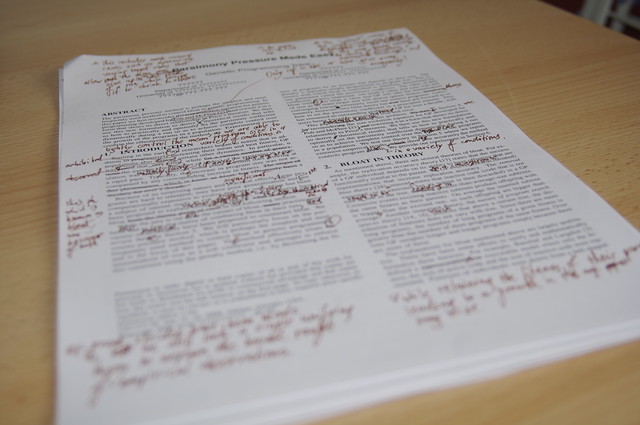 |
| Photo credit: Nic's events on Flickr |
Where to begin? Well, it's simple, really: just follow these steps and you'll make writing history with your critiquing prowess.
How to Be the Most Incredible Critique Partner Ever*
- Deadlines? What deadlines? Many times you and your new critique partner will work out a timeframe for how long you have to critique each other's work. Go ahead and agree to whatever they want, but don't stress about actually delivering on time—they'll want your critique so bad it won't matter if you deliver it in a timely fashion.
- Be super nice. Awesome critique partners don't hurt each other's feelings, so make sure you find something that you like on every page and go on and on about how wonderful it is and what incredible writers they are. This will also force them to be nice to you during their critique of your work.
- Or don't say anything at all. Sometimes the writing is so bad that you can't find anything you like—it all needs major revisions. When that happens, just leave a "no comment" note at the bottom. You know what they say, if you can't be nice...
- Or destroy them. Sometimes the writing is so good that you can't find anything bad—this is when you force yourself to find something bad on every page and rip it to shreds. Make sure they're so discouraged by your critique that they'll never attempt to publish it, because if they do, you're going to have some major competition. Kill the WIP! Kill it with fire!
- Be concise. Regardless of whether or not you decide to be nice, make sure your critique is as short and simple as possible. Responses like "cool" and "bad" and "nice" are ideal. Bonus points if you do your entire critique with smiley faces. :) :( ^_^ O.O >.< XD >:(
- Don't be too helpful. You don't want them to make their work too good—after all, everyone is your competition.
- Compare everything to your work. Your masterpiece is the gold standard—leave comments like, "Remember how I wrote x scene in my manuscript? Write it like that."
- Have someone else critique it. You have better things to do than critique people's work, anyway.
- Offer to write their WIP for them. Honestly, why are you even wasting your time critiquing their work? You could write it so much better.
- Why do you even need a critique partner, anyway? Your work is absolutely incredible—why did you waste your time with a critique partner? Why are you wasting your time looking at someone else's work? And why are you not getting paid yet?
*This is another sarcastic post—as in, for the love of all things literary, please do not take these points seriously! Promise? Good.
Now it's your turn: what "tips" would you add for being a fabulous critique partner?








8 comments:
My tips: use lots of exclamation points!!!!!!! When you're critiquing, use rules that nobody actually obeys anymore - as in, delete ALL the sentence fragments, even if they work as a device. Also, completely disregard the things they tell you to look out for - you know how to critique!
Love the tips, Emily!!!!! I'll have to start implementing those!!!!!!!!!!!!! :D
Lol the whole critique in smiley faces. I take that as a challenge :P
You know, it'd probably be fun...just entirely unhelpful. :D
Or: throw the manuscript in a fire and burn it. THEN, tell the author that they need to work on their sentence construction. Show, not tell, am I right?
But seriously, don't do that XD By the way, (this is totally unrelated), I had a question. In one of your previous posts, you mentioned only writing standalone novels...do you have any tips for writing pure fantasy (like about another world) in one book? Of course, the average length of one fantasy standalone is 134, 000 words, so NaNo is just getting me started.
Love your sarcasm, as always. I've recently found a wonderful critique partner, and I'm happy to say that neither of us employ any of the tactics listed in your post! :)
First and foremost, I love your "tip," especially the "show don't tell" anecdote. Great addition to the list. :D
Now as for writing standalone versus series...I don't write pure fantasy, nor do I read very much of it (I'm a bit addicted to the YA genre, and even within that, pure fantasy doesn't get as much attention from me as some other sub-genres), so it's a little difficult for me to comment on writing pure fantasy.
That being said, what sort of tips are you looking for? If it's NaNo related, I wouldn't worry about length just yet--get it written first in it's entirety, then worry about trimming it down (or adding to it) to fit the right ballpark area of word count per genre. I'm not quite sure if that's what you meant, though...
Thank you, Julia! Good to hear you and your critique partner have avoided these sins. :)
Post a Comment